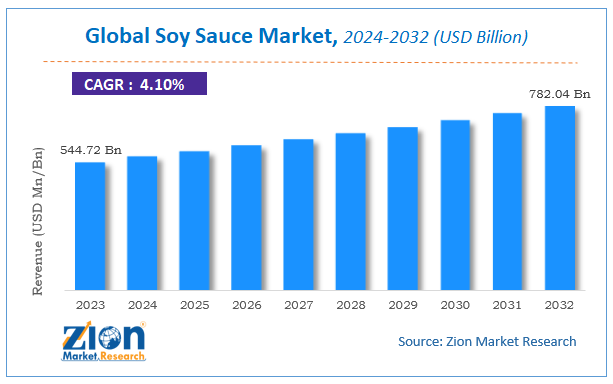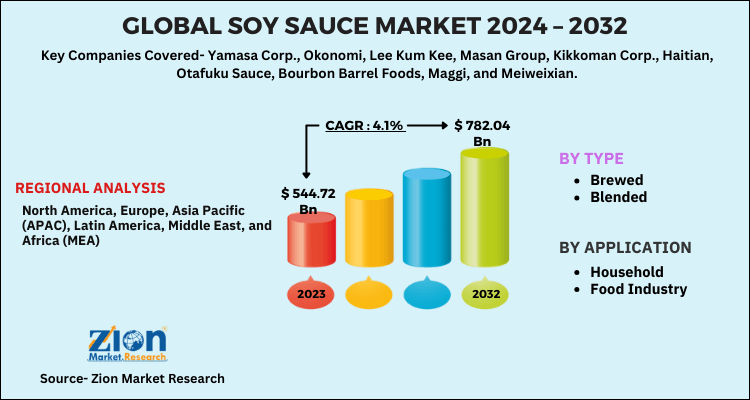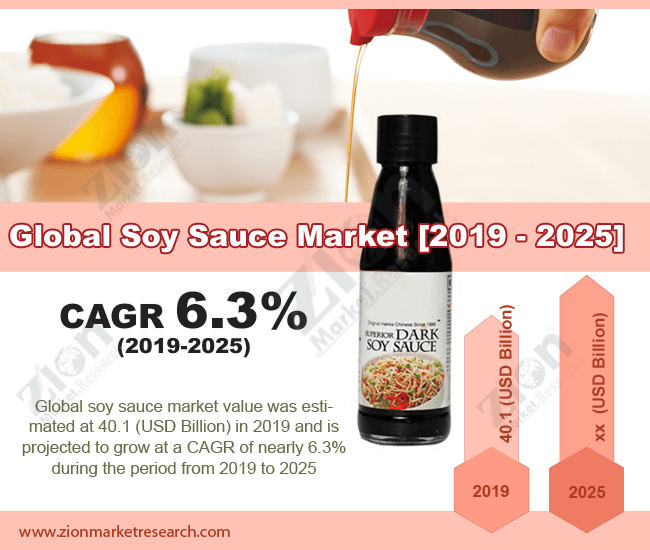Soy Sauce Market Size, Share, Trends, Growth and Forecast 2032

Soy Sauce Market Size, Share & Trends Analysis Report - By Application (Food Industry and Household), By Type (Blended and Brewed), and By Region - Global Industry Perspective, Comprehensive Analysis, and Forecast, 2024 - 2032-
| Market Size in 2023 | Market Forecast in 2032 | CAGR (in %) | Base Year |
|---|---|---|---|
| USD 544.72 Billion | USD 782.04 Billion | 4.1% | 2023 |
Soy Sauce Market Insights
According to Zion Market Research, the global Soy Sauce Market was worth USD 544.72 Billion in 2023. The market is forecast to reach USD 782.04 Billion by 2032, growing at a compound annual growth rate (CAGR) of 4.1% during the forecast period 2024-2032.
The report offers a comprehensive analysis of the market, highlighting the factors that will determine growth, potential challenges, and opportunities that could emerge in the Soy Sauce industry over the next decade.
Market Overview
Soy sauce is a popular condiment that has been widely used in Asian cuisine for centuries. It is a dark, salty liquid made from fermented soybeans, wheat, salt, and water, with variations in ingredients and preparation methods across different regions and cultures. Soy sauce is commonly used as a seasoning in dishes such as stir-fries, marinades, and dipping sauces, and it is also used as a table condiment. The growth of the global soy sauce market is driven by various factors, including the increasing popularity of Asian cuisine and the growing demand for natural and healthy food products. Soy sauce is considered to be a healthy alternative to other condiments, such as ketchup and mayonnaise, as it is lower in calories, fat, and sugar, and contains beneficial nutrients like protein and amino acids.
The increasing preference for soy sauce as a seasoning component and flavor additive is the primary driver of the global soy sauce market. During the forecast period, food retail chains, manufacturers, and restaurants are projected to influence the market. Soy sauce is becoming a popular ingredient in a variety of popular cuisines, including Chinese, Japanese, Indonesian, Thai, Malaysian, and Vietnamese. A growing variety of country cuisines utilizing the market as their primary component will accelerate market expansion significantly during the forecast period on a global scale.
Introduction
Soy sauce is a traditional fermented all-purpose seasoning which is most popular in East Asia and is exported from the East Asian countries to other parts across the globe. It has a salt taste as well as sharp flavor. Furthermore, in the traditional process of soy sauce preparation, roasted wheat & cooked soybeans are added to aspergillus species spores. Then the mixture is fermented for span of two days in order to produce koji, which is then added to brine for producing moromi, a kind of mash that ferments resulting in soy sauce production. Additionally, phenolic compounds including 4-ethylphenol and 4-ethylguaiacol are added to soy sauce to impart flavor to it.
Furthermore, it takes more than six months for complete fermentation and moromi mash aging. Thus, soy sauce production through traditional methods is a time-consuming process and hence new methods for its continuous brewing or fermentation are utilized.
In Japan, soy sauce is referred as shoyu is prepared from wheat and soybeans mixed in the equal proportion. The two raw constituents are broken down into peptides and amino acids with the help of microbial proteolytic enzymes after fermentation.
Market Growth Dynamics
As per NCBI study, the soy sauce (shoyu) comprises of nearly 1% of shoyu polysaccharides that demonstrate anti-allergic features in vivo and in vitro. Moreover, oral shoyu polysaccharides supplements have proved to be effective against allergic rhinitis. Thus, soy sauce has proved as a promising seasoning for treating allergic ailments through diet due to its anti-allergic as well as hypoallergenic characteristics. All these aforementioned aspects are anticipated to steer the growth of soy sauce market over the coming years.
According to NCBI, research conducted in year 2005 on shoyu to study its functional effects demonstrated favorable or beneficial outcomes on human health. For instance, the intake of soup consisting of soy sauce increased the gastric juice secretion in humans, thereby improving & catalyzing the digestive process in humans.
Furthermore, soy sauce exhibits antimicrobial features against bacteria including Staphylococcus aureus, Vibrio cholera, nonpathogenic Escherichia coli, Salmonella enteritidis, Shigella flexneri, and pathogenic E. coli. Apart from this, the product also comprises of anti-hypertensive constituents and displays anti-carcinogenic effects. All these factors are likely to lucratively influence the expansion of soy sauce industry over the forecasting years.
Soy Sauce Market: Report Scope
| Report Attributes | Report Details |
|---|---|
| Report Name | Soy Sauce Market |
| Market Size in 2023 | USD 544.72 Billion |
| Market Forecast in 2032 | USD 782.04 Billion |
| Growth Rate | CAGR of 4.1% |
| Number of Pages | 110 |
| Key Companies Covered | Yamasa Corp., Okonomi, Lee Kum Kee, Masan Group, Kikkoman Corp., Haitian, Otafuku Sauce, Bourbon Barrel Foods, Maggi, and Meiweixian |
| Segments Covered | By Type, By Application And By Region |
| Regions Covered | North America, Europe, Asia Pacific (APAC), Latin America, Middle East, and Africa (MEA) |
| Base Year | 2023 |
| Historical Year | 2018 to 2022 |
| Forecast Year | 2024 - 2032 |
| Customization Scope | Avail customized purchase options to meet your exact research needs. Request For Customization |
Asia Pacific To Lead Overall Market Growth During 2024-2032
The growth of the regional market over the forecast timeline is owing to huge manufacture or brewing of soy sauce in the countries such as Japan, China, and Korea. In addition to this, hue intake of the product along with the regular diet across the Southeast Asian nations will accelerate the market growth in the Asia Pacific zone over the ensuing years.
Key players profiled in the report include-
- Yamasa Corp.
- Okonomi
- Lee Kum Kee
- Masan Group
- Kikkoman Corp.
- Haitian
- Otafuku Sauce
- Bourbon Barrel Foods
- Maggi
- Meiweixian.
The global soy sauce market is segmented as follows:
By Type
- Brewed
- Blended
By Application
- Household
- Food Industry
By Region
- North America
- The U.S.
- Canada
- Europe
- France
- The UK
- Spain
- Germany
- Italy
- Rest of Europe
- Asia Pacific
- China
- Japan
- India
- South Korea
- Southeast Asia
- Rest of Asia Pacific
- Latin America
- Brazil
- Mexico
- Rest of Latin America
- Middle East & Africa
- GCC
- South Africa
- Rest of Middle East & Africa
Table Of Content
Methodology
FrequentlyAsked Questions
global Soy Sauce Market was worth USD 544.72 Billion in 2023. The market is forecast to reach USD 782.04 Billion by 2032,
growing at a compound annual growth rate (CAGR) of 4.1% during the forecast period 2024-2032
The largest share of the Soy Sauce Market is held by Asia Pacific. Developing countries of Asia Pacific such as China, Japan, and India will be dominating the market scenario mainly due to the rising constructional activities. The growth of Asia-Pacific region is expected to be followed by the Middle East and North America. Also, significant growth is expected from Western Europe owing to the developments taking place in this region especially in countries such as Italy, Germany, the U.K, France, and Spain. However, growth in Africa, Latin America, and Eastern Europe is anticipated to be moderate over the forecast period.
Yamasa Corp., Okonomi, Lee Kum Kee, Masan Group, Kikkoman Corp., Haitian, Otafuku Sauce, Bourbon Barrel Foods, Maggi, and Meiweixian
Choose License Type
RelatedNews
HappyClients
Zion Market Research
Tel: +1 (302) 444-0166
USA/Canada Toll Free No.+1 (855) 465-4651
3rd Floor,
Mrunal Paradise, Opp Maharaja Hotel,
Pimple Gurav, Pune 411061,
Maharashtra, India
Phone No +91 7768 006 007, +91 7768 006 008
US OFFICE NO +1 (302) 444-0166
US/CAN TOLL FREE +1 (855) 465-4651
Email: sales@zionmarketresearch.com
We have secured system to process your transaction.
Our support available to help you 24 hours a day, five days a week.
Monday - Friday: 9AM - 6PM
Saturday - Sunday: Closed








